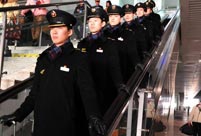 Cockfighting show staged in E. China's Heze during Spring Festival
Cockfighting show staged in E. China's Heze during Spring Festival
 Chinese New Year Flower Fair opens in San Francisco
Chinese New Year Flower Fair opens in San Francisco
 Festivities in Shanghai
Festivities in Shanghai
 PLA navy conducts drill in North China Sea
PLA navy conducts drill in North China Sea
 World's high-tech hotels
World's high-tech hotels
 Li Na poses with trophy on Brighton Beach in Melbourne
Li Na poses with trophy on Brighton Beach in Melbourne
 Six Chinese divers back safely after 300-meter saturation dive
Six Chinese divers back safely after 300-meter saturation dive
 Traditional wedding ceremony of Yao people
Traditional wedding ceremony of Yao people
 Taipei Game Show attracts geeky gamers
Taipei Game Show attracts geeky gamers
BEIJING, Jan. 29 -- The upcoming Chinese New Year is set to be less noisy and consumerist than usual as concern over air pollution has combined with authorities' ongoing frugality and anti-corruption drive to depress sales of fireworks and luxury gifts.
The Beijing Meteorological Bureau said on Tuesday that the smog shrouding the capital will linger during the first five days of the holiday, which begins on Jan. 31. Meteorologists have advised citizens to refrain from setting off firecrackers and called for a temporary ban if air conditions spike to dangerous levels.
The Beijing municipal government also said it would suspend sales of firecrackers to citizens and impose a day-long ban on fireworks if air pollution reaches the worst levels on charts.
Static air flow will also likely lead to hazy weather in parts of central and eastern China during the holiday, said Chen Zhenlin, a meteorologist with the China Meteorological Administration during a press conference in Beijing.
In Shanghai, poll results published on Tuesday showed that more than 85 percent of respondents in the city will not buy firecrackers during the Chinese New Year, while 81 percent would like the government to ban firecrackers year around.
"Sales will definitely be bad during the new year holiday," said a firecracker retailer from Hangzhou in east China's Zhejiang Province. "People simply don't want to make this bad weather worse."
Besides the business of fireworks, the country's anti-extravagance drive has meant a dwindling market for luxury goods, a category that usually sees strong sales in the holiday season.
Since the launch of the frugality campaign by the Communist Party of China's leadership in late 2012, a slew of concrete measures have been issued to uproot bureaucratic and extravagant work styles among government workers, such as bans on flower arrangements in meeting rooms, expensive liquor, delicacies such as shark fins and bird nests, as well as luxury gifts during festivals.
Businessmen in Lhasa's caterpillar fungus market have been experiencing a hard time in this new year season, as demand has nose-dived.
The value of caterpillar fungus, a rare Chinese herbal medicine that grows only on the Qinghai-Tibetan Plateau, has been equated with that of gold. It is often bought as an expensive gift for government officials.
"No one dares to receive such precious gifts any more," said Dou Qinlian, a manager at a shopping mall in Lhasa. "There has been a sharp drop in the number of people buying the medicine as a gift both in Tibet and elsewhere in China."
In Lanzhou, capital of northwest China's Gansu Province, a flower market stall-holder surnamed Wang said the Chinese New Year previously marked the peak season for expensive flowers, but this year sales have plunged.
"Sales of flowers priced over 200 yuan [about 33 U.S dollars] per pot are down 75 percent on last year," he said.
According to Wang, expensive flowers were mostly purchased by government and state-owned companies to grace their meetings and gatherings celebrating the Chinese New Year, and the people who bought flowers as festival gifts were also willing to spend large sums of money.
This change of consumption patterns has also taken a toll on the retail gold market.
In Changchun City, capital of north China's Jilin Province, sales growth of gold bars has slowed sharply, while the popularity of smaller-sized gold ornaments is growing.
A customer manager in a branch of China Construction Bank said few people now buy gold bars that weigh above 10 grams, while most choose gold ornaments weighing from five to 10 grams as holiday gifts for relatives and friends.
Zhang Fan, a civil servant from Kunming of southwest China's Yunnan Province, said this Spring Festival will be more quiet and relaxing than before, for he plans to spend most of the time staying at home during the seven-day holiday because of the smoggy conditions and fewer gifts.
"With fewer firecrackers and gift exchanges, this holiday will be more about a time for family reunion and having a break from work," he added.
 3D film 'The Monkey King' premieres in Beijing
3D film 'The Monkey King' premieres in Beijing  Miss Chinese Int'l Pageant 2014 held in Hong Kong
Miss Chinese Int'l Pageant 2014 held in Hong Kong 'Golden Flowers' in the Spring Festival travel rush
'Golden Flowers' in the Spring Festival travel rush Li Na beats Cibulkova to win Australian Open
Li Na beats Cibulkova to win Australian Open Sexy models at Taipei Game Show 2014
Sexy models at Taipei Game Show 2014 'Living in ice house' competition held in central China
'Living in ice house' competition held in central China  Highlights of Chinese airborne troops'exercises
Highlights of Chinese airborne troops'exercises  All-male high speed train crew during Spring Festival travel rush
All-male high speed train crew during Spring Festival travel rush PLA navy drills in East China Sea
PLA navy drills in East China Sea President Xi visits border troops ahead of Lunar New Year
President Xi visits border troops ahead of Lunar New Year What do Chinese pack in their luggage in Spring Festival Rush?
What do Chinese pack in their luggage in Spring Festival Rush? Blind date fair in Hangzhou of Zhejiang province
Blind date fair in Hangzhou of Zhejiang province Film 'Where Are We Going, Dad' premiered in Beijing
Film 'Where Are We Going, Dad' premiered in Beijing  Australian Open champion Li Na returns to hometown Wuhan
Australian Open champion Li Na returns to hometown Wuhan Twin sisters serve during Spring Festival travel rush for the first time
Twin sisters serve during Spring Festival travel rush for the first timeDay|Week|Month